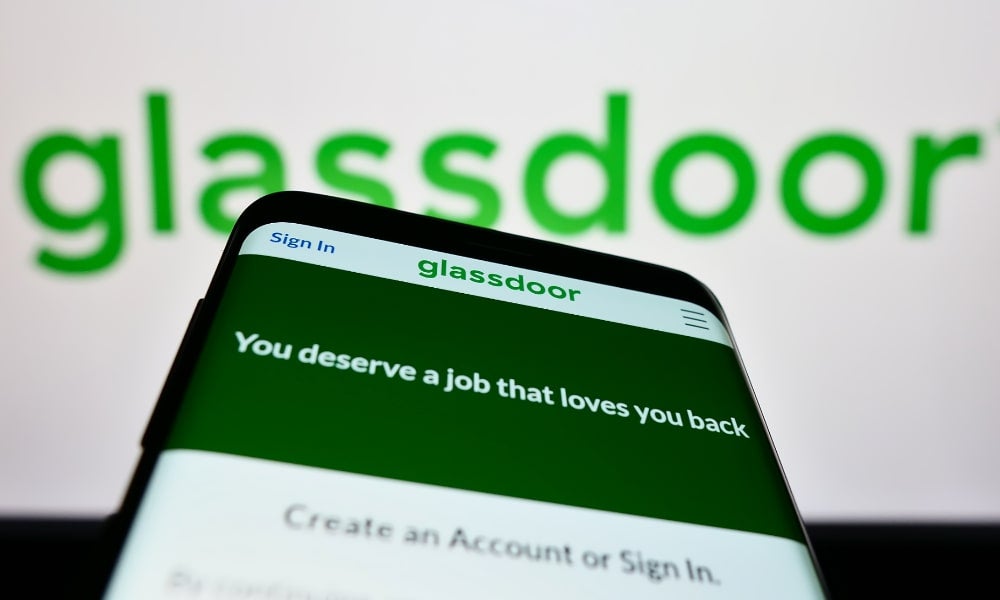Secrets of Christian Sutherland-Wong’s career success
Christian Sutherland-Wong says there have been a number of important career-defining moments in his journey to becoming CEO of Glassdoor
Glassdoor CEO Christian Sutherland-Wong never imagined he would be a CEO. In fact, he had his heart set on becoming an actuary when he was studying for a Bachelor of Commerce at UNSW Business School. With an early love of music and mathematics (and probabilities and statistics in particular) he was actively looking for avenues to apply this to his future career. While his first job was as a soloist at the Sydney Opera House at the tender age of 11, his career journey leaned towards being in the business of mathematics as his schooling progressed. “Being an actuary seemed like a good path,” said Mr Sutherland-Wong, who recently spoke as part of UNSW Business School’s Meet the CEO digital event.
He recalls a pivotal moment in his career journey during his second year of studies when a UNSW alumnus who was working as a management consultant needed help with some Excel grunt work for his client, Lion Nathan. The alumnus reached out to UNSW and was put in touch with Mr Sutherland-Wong, who eagerly put his hand up for the opportunity.
“I worked on this project with him, and that was transformative in that I not only did the back-office Excel analysis, but he brought me along to the meetings. So here I was in the boardroom of Lion Nathan, and it was such an experience to get to talk directly with executives and present my work,” he recalled.
After the meeting, the alumnus pulled Mr Sutherland-Wong aside to discuss his potential career path and the statistical probabilities of life as an actuary. “He said to me, ‘You know, Christian, if you go down that path, I’m not sure you’ll be getting into the boardroom anytime soon. It’s going to take years to work your way there. But if you become a management consultant, you’ll do that straight away.’ So that seed was planted, and by the time I finished my time at UNSW, I decided I wanted to be a management consultant for those reasons.”
From commerce student to CEO
Mr Sutherland-Wong, who was interviewed for Meet the CEO by Ellen Derrick, managing partner of consulting for Deloitte Australia, member of the UNSW Business School Advisory Council and AGSM @ UNSW Business School Alumna, explained that his next significant step was to join Bain as a consultant, specialising in financial services, private equity and telecommunications. This experience lived up to his expectations in terms of exposure to executives, with global travel and other demands (and perks) of the job, Mr Sutherland-Wong recalled: “It was exciting for a person in their early 20s,” he said. “But it’s also pretty hard work, because the travel got tiring.”
After two years of working for Bain, Mr Sutherland-Wong went on to study for an MBA at Harvard in 2007. During this time he signed up to Facebook, which got him interested in social media as a potential career path. “I could just see this was a part of a bigger social networking movement that was going to change human behaviour. And I could see it already changing the way we communicate,” he recalled.
Read more: Xendit's Moses Lo: four tips for budding entrepreneurs
He undertook some technology and social networking-related courses as part of his MBA, with an eye on LinkedIn as the “underrated social network at the time”. He subsequently joined the company upon graduating from Harvard, which he said was a great decision. At the time the company only employed a couple of hundred people (before growing to more than 8000 people when he moved on five years later). During his time there, Mr Sutherland-Wong took on roles including director of product management, in which he grew revenue through subscriptions, ads, jobs and corporate solution offerings by a multiple of 10 to more than $500 million (which accounted for more than 20 per cent of LinkedIn’s total revenue).
“I got to run a big part of LinkedIn, which was a great opportunity because LinkedIn was growing so fast. That was a really wonderful experience,” said Mr Sutherland-Wong. His next step was to take some time off and travel the world with his family for just over a year, before joining Glassdoor as VP of Product in 2015. He progressed through a number of roles including SVP monetisation and President and COO, before being appointed CEO in early January 2020.

Leading and learning through covid
When he took on the role of CEO, Glassdoor was experiencing strong growth and business conditions were healthy. “I was full of hope,” he recalled. “Glassdoor was growing fast. We had 1000 employees across seven countries around the world. We had just opened up an office in Paris and we had just taken out all this amazing space in San Francisco, with the expectation that we would grow our headcount at that time.”
But covid stuck in March 2020, which changed everything for the company. “This thing, which we’d been hearing about in December, then January and February, came along – and by March it was here. We first sent everybody home and said, ‘Okay, we’re going to hunker down and get through this,’ and we thought we would be at home for two, maybe four weeks. But that time came and went,” he said.
“One of the scariest things for us at Glassdoor was that we made all of our money through recruiting. And one thing that almost every company across the world did when covid hit was they stopped recruiting. There were hiring freezes and that meant that our revenue basically dried up overnight. That’s a pretty scary proposition if you’re looking down the barrel of no revenue for a really extended period with no end in sight.”
Listen now: How to build a culture that attracts and retains talented staff
Mr Sutherland-Wong reflected on the major learnings of the past few years, one of which was being forced to prioritise. This process laid the foundations for a new strategy and a strategic shift in the company, however, he said this shift would take at least a couple of years to effect. A decision was made to accelerate into the new strategy but also shut down other parts of the business which were not viewed as being core over the long-term.
“That was a hard decision,” he said. “It also meant that we went through layoffs. And I’d never in my career, up until that time, been firsthand to layoffs. And now here I was, a new CEO, having to deliver layoffs to the company. That was absolutely the hardest thing I’ve ever done in my career.”
The company laid off about 300 people, which accounted for almost a third of its workforce, and Mr Sutherland-Wong recalled the day he had to deliver the bad news. “I still remember the day vividly when we announced we were doing the layoffs via Zoom, because obviously we were not together. And I turned off the Zoom call and just burst into tears. I can look back on that and say the decisions we made then seemed to be the right ones. The new strategy is working well for us. But it was absolutely the hardest thing to do, and it’s not something that I hope to do have to do again in my career. I certainly had a lot of learnings, with a baptism of fire taking over as CEO in 2020,” he said.

Career advice for aspirational leaders
In the interview, Ms Derrick quizzed Mr Sutherland-Wong about his leadership style, how this had changed over the years, and the most successful approach to leading people through good times and bad. He acknowledged that his inspirational moments have come from learning from other leaders on the job, particularly at LinkedIn and Glassdoor.
“I learned so much from just observing them,” said Mr Sutherland-Wong, who said he thought the role of leaders was just to make the right business decisions in the earlier stages of his career. While this worked relatively well in terms of career success and responsibility, he said he didn’t appreciate the value of relationships enough and he was sometimes too quick to judge. “I started to see the leaders above me in these companies, and they had a different style. They were able to be more effective with larger groups of people and to get the best out of their people,” he said.
Mr Sutherland-Wong said his leadership style has changed noticeably over the years, and he now thinks leadership is more about creating the conditions for others to succeed, being clear about issues and expectations, and working with others to better understand their own drivers for performance. In adjusting his own style, he has seen how this has transformed the effectiveness of others who have gone from struggling to flourishing (along with their team) because of a more collaborative approach.
Subscribe to BusinessThink for the latest research, analysis and insights from UNSW Business School
“People, if they have a relationship with you, will walk over hot coals and move mountains for you. They feel inspired. But if you treat them transactionally, you’re not going to get the best out of them,” he said.
For those who are new to leadership roles, he encouraged them to just embrace transparency. “It seems scary at first, but the more you embrace it, the more you will see how powerful it is. In the most basic sense, transparency is just a way in which you provide more information to people and treat them like adults to let them make informed decisions.
“The old style of thinking of companies hierarchically, in which people only get the information they need to know – companies like that end up underperforming companies that are more open with information with employees in a knowledge worker-based economy. You need to empower them to make decisions with more information,” he said. “CEOs now realise that’s actually the formula for success.”

